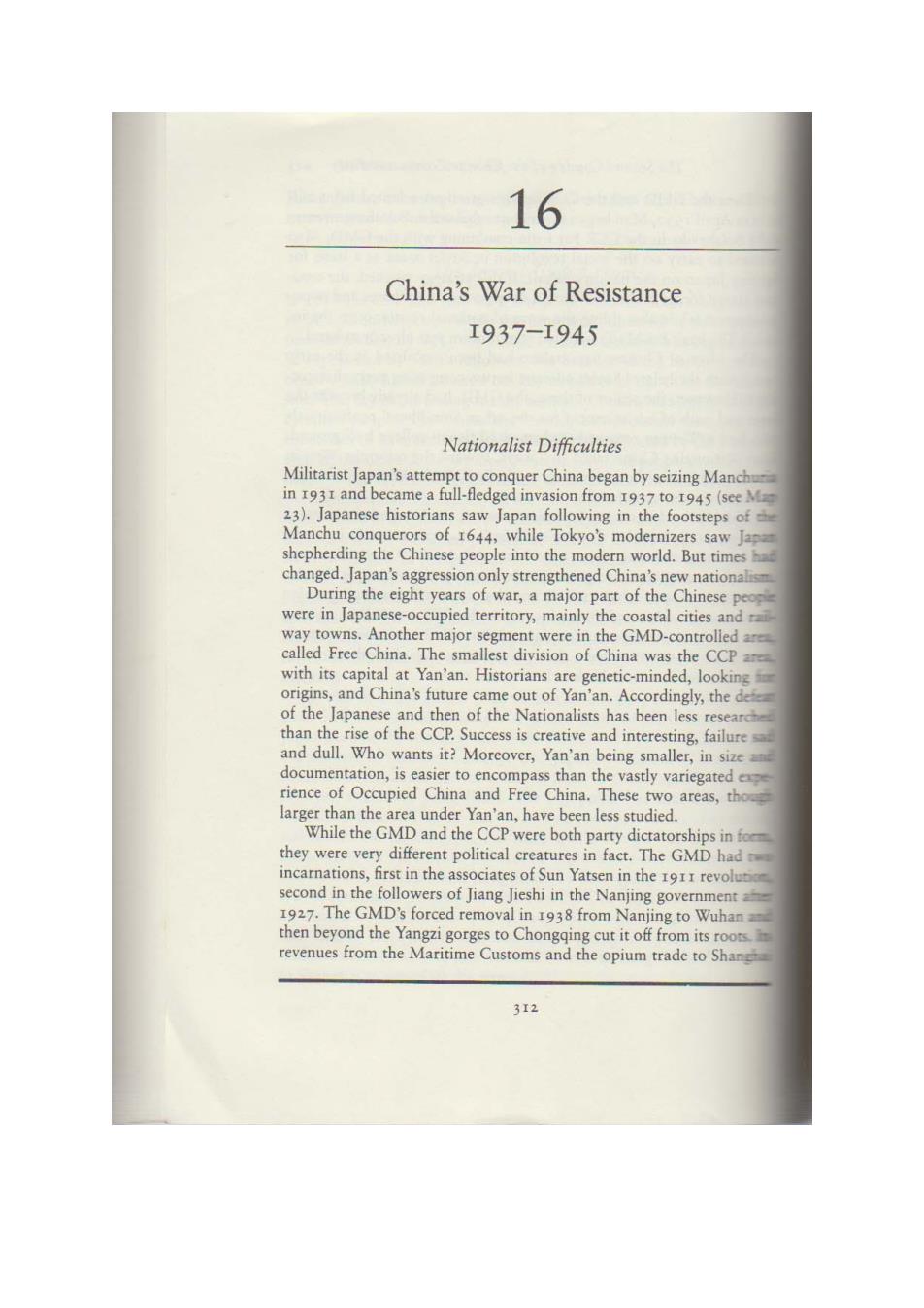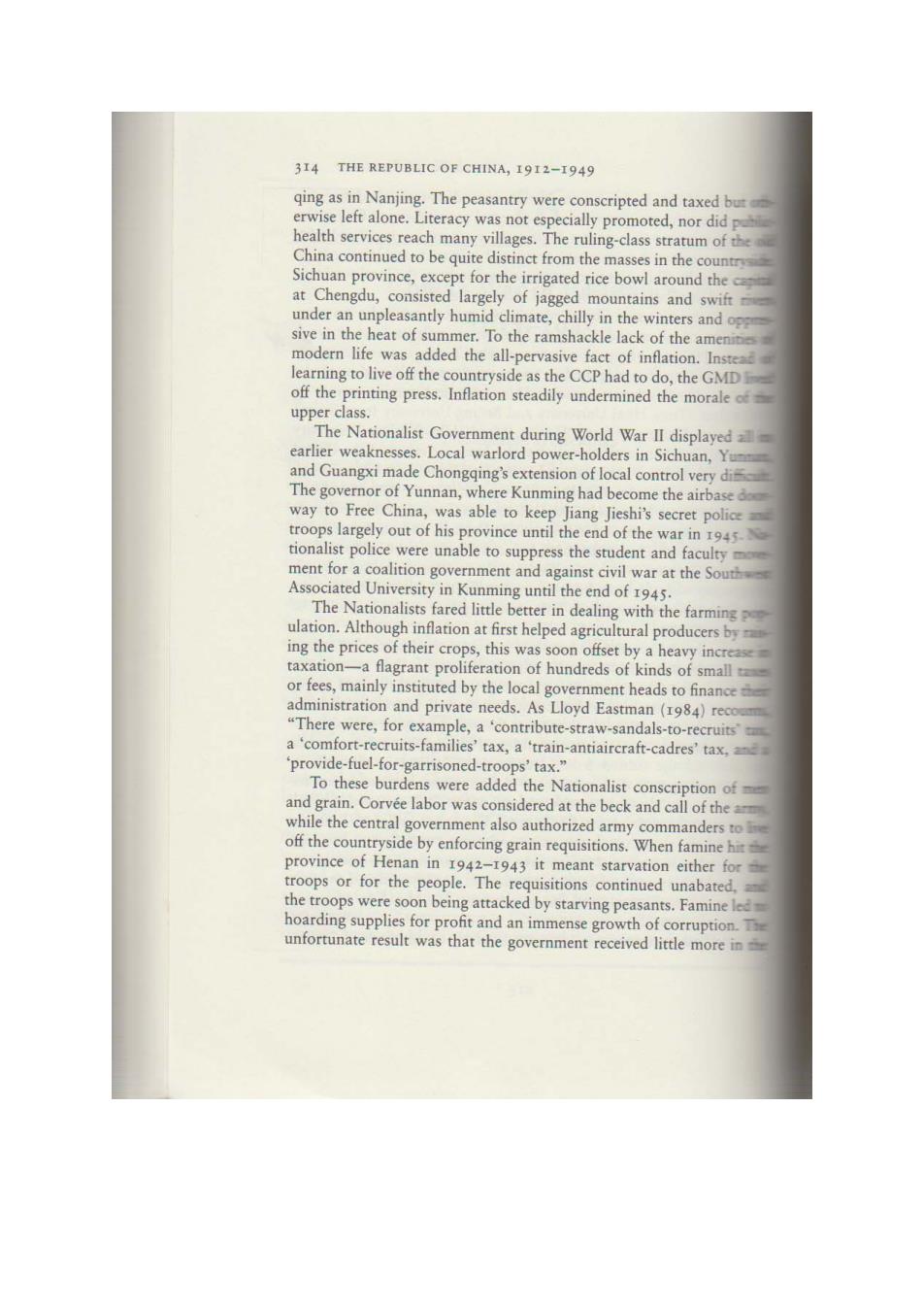
16 China's War of Resistance I937-I945 Nationalist Difficulties Militarist Japan's attempt to conquer China began by seizing Manch in I93 I and became a full-fledged invasion from I937 to 1945(see M 23).Japanese historians saw Japan following in the footsteps of Manchu conquerors of 1644,while Tokyo's modernizers saw Ja shepherding the Chinese people into the modern world.But times changed.Japan's aggression only strengthened China's new nationalis- During the eight years of war,a major part of the Chinese peo were in Japanese-occupied territory,mainly the coastal cities and way towns.Another major segment were in the GMD-controlled a called Free China.The smallest division of China was the CCPa with its capital at Yan'an.Historians are genetic-minded,looking origins,and China's future came out of Yan'an.Accordingly,the de of the Japanese and then of the Nationalists has been less researd than the rise of the CCP.Success is creative and interesting,failure and dull.Who wants it?Moreover,Yan'an being smaller,in size documentation,is easier to encompass than the vastly variegated rience of Occupied China and Free China.These two areas,tho larger than the area under Yan'an,have been less studied. While the GMD and the CCP were both party dictatorships in fo they were very different political creatures in fact.The GMD had incarnations,first in the associates of Sun Yatsen in the I9Ir revolu second in the followers of Jiang Jieshi in the Nanjing government 1927.The GMD's forced removal in I938 from Nanjing to Wuhan then beyond the Yangzi gorges to Chongqing cut it off from its roots revenues from the Maritime Customs and the opium trade to Shan 3I2

China's War of Resistance 313 eknocked out.Its hard-won echelon of modern-trained administra- became refugees.From being the central government of China,the onalist regime was now a fugitive in a mountain-ringed redoubt, ged to work with reactionary provincial militarists and landlords.In sChina the Chongqing government tried to keep the local warlords e and avoid upsetting the social order in the villages. China's nascent sino-liberal educational system suffered a grievous ruction of plant and facilities.Missionary colleges kept at work er the Japanese occupation but in purely Chinese universities many ents and faculties migrated in 1937-1938 up the Yangzi or to the hwest.The Southwest Associated University at Kunming was set up Qinghua(Tsing Hua)University and Beijing University from Beijing Nankai University from Tianjin.Meanwhile,Yanjing University other Christian institutions,after the Japanese attacked the United in December 1941,gathered at the site of the West China Union ersity in Chengdu.Whole industrial plants were dismantled and ped upriver,where the National Resources Commission had already developing mines and industries.Intellectuals and government ad- trators,with great patriotism,put up with displacement from their and learned to live primitively in the interior.Unfortunately,al- h they were the main body of modern China's professional people, hopes went unrewarded.This was due partly to the ineptitude of government. ith admirable fortitude but little foresight,the Nationalist regime ts problem by short-term expedients that gave it little strength for ture.The Chongqing government got control of the land tax in as the wherewithal to feed its administration.Its industrial devel- had arsenals at work to support the war.The spirit of resistance stimulated by the Japanese bombing of Chongqing,but meanwhile spirit of the united front deteriorated.Radical intellectuals in gqing began to drift northward to Communist Yan'an,except for who were already "outside cadres"of the CCP assigned to work sensible liberals in the GMD area.The secret police of both the and the government felt more and more compelled to keep the s in line as potential subversives.Strong-arm methods against stu- publishers,and other seeming enemies steadily widened the split en the intellectuals and the government that hoped to rely upon for the future. ang Jieshi's regime was as unimaginatively conservative in Chong-

314 THE REPUBLIC OF CHINA,1912-1949 qing as in Nanjing.The peasantry were conscripted and taxed but erwise left alone.Literacy was not especially promoted,nor did p health services reach many villages.The ruling-class stratum of the China continued to be quite distinct from the masses in the countr Sichuan province,except for the irrigated rice bowl around the c at Chengdu,consisted largely of jagged mountains and swift under an unpleasantly humid climate,chilly in the winters and op sive in the heat of summer.To the ramshackle lack of the amenin modern life was added the all-pervasive fact of inflation.Instea learning to live off the countryside as the CCP had to do,the GMD off the printing press.Inflation steadily undermined the morale upper class. The Nationalist Government during World War lI displayed earlier weaknesses.Local warlord power-holders in Sichuan,Yu and Guangxi made Chongqing's extension of local control very di The governor of Yunnan,where Kunming had become the airbase d way to Free China,was able to keep Jiang Jieshi's secret police troops largely out of his province until the end of the war in 1945 tionalist police were unable to suppress the student and facultym ment for a coalition government and against civil war at the South Associated University in Kunming until the end of 1945. The Nationalists fared little better in dealing with the farming ulation.Although inflation at first helped agricultural producers by ing the prices of their crops,this was soon offset by a heavy increase taxation-a flagrant proliferation of hundreds of kinds of small or fees,mainly instituted by the local government heads to finance administration and private needs.As Lloyd Eastman(1984)recc "There were,for example,a 'contribute-straw-sandals-to-recruits' a 'comfort-recruits-families'tax,a 'train-antiaircraft-cadres'tax, provide-fuel-for-garrisoned-troops'tax." To these burdens were added the Nationalist conscription of and grain.Corvee labor was considered at the beck and call of the a while the central government also authorized army commanders to off the countryside by enforcing grain requisitions.When famine hi province of Henan in 1942-1943 it meant starvation either for troops or for the people.The requisitions continued unabated, the troops were soon being attacked by starving peasants.Famine le hoarding supplies for profit and an immense growth of corruption.T unfortunate result was that the government received little more in

and its claimed territories in 1933 U.S.S.R. t of occupation,1937 SAKHALIN t of occupation,1938 t of occupation,1939 est extent of Japanese conques =Cna,1942 MONGOLIA 一… aotou Beijing Sea of Japan Tanggu JAPAN Xining Yan'an NDO Qingdao Xi'an aifeng SU Cheng Shanghai Ningbo Changsha Nancha East China Sea Kunming Xiamen ou .Guilin RYUKYU Guan安 TAIWAN Shantou Hanoi Hong Kong UK HAINAN ea LAND FRENCH INDO-CHINA South China Manila PHILIPPINE ISLANDS Pacific Ocean Saigon BRUN史 ORN Singapore SARAWAK CELEBES 020040060000km DUTCH EAST InDIES R.Forget 23.The Japanese Invasion of China

316 THE REPUBLIC OF CHINA,I9I2-1949 way of resources while the petty officials and landlords found out how to profit in the inflation.By the war's end,peasant rebellions were is cipient in several provinces of Free China. Meanwhile,both the Nationalist Government at Chongqing and the CCP at Yan'an fought a two-front war,against Japan and against eac other.The war against Japan that had begun outside Beijing on July- 1937,led to the announcement in August and September of a unite front agreement between the CCP and the GMD.The CCP agreed stop its armed revolution to change Chinese society and gave upth forcible confiscation of landlords'land,while its Red Army would be placed under central government command.On its part,the GMD would let the CCP establish liaison offices in several cities,publish New China Daily in Chongqing,and be represented in GMD adviso bodies.From this time on,the form of the united front was maintaine The Red Army was now called the Eighth Route Army,and Zhou Enla resided in Chongqing to represent it.Having spent 1938 at the trans tional capital in Wuhan,he was already the CCP's foreign ministera representative to the world press. The terms of the united-front agreement remained on paper unch lenged,but in fact developments undid it.Yan'an refused to have Na tionalist staff officers in its area.In effect,the Eighth Route Army con ued to be an independent force in spite of a small subsidy from Nationalists.Meanwhile,the CCP in building up its base areas ma tained order,encouraged economic production through devices such mutual-aid teams,and kept on recruiting poor peasant activists, would eventually get the upper hand over the rich peasants.Party me bership grew from some 40,ooo claimed in 1937 to an alleg I,200,ooo in 1945,while the armed forces increased from 92,oo0 1937 to perhaps 91o,ooo in 1945. Mao's Sinification of Marxism To control and direct the widespread organization of the CCP mo ment over the broad stretches of North China required dedicated disciplined party members,experienced cadres(activists)in the villag an attempt at self-sufficiency in each base,and the use of radio teleg phy to transmit messages.The principle of centralized control over decentralized situation was exhibited in the government organiza The Central Committee of the party had its departments at Yan'an d ing with military affairs,organization,united-front work,ene